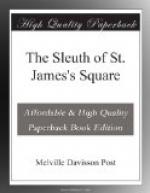The figure 3 had been changed to 5 so cunningly is to deceive the eye, but not to deceive the vast magnification of the crystal. The thing stood out big and crude like a carpenter’s patch.
Gosford’s face became expressionless like wood, his body rigid; then he stood up and faced the three men across the table.
“Quite so!” he said in his vacuous English voice. “Marshall wrote a 3 by inadvertence and changed it. He borrowed my penknife to erase the figure.”
My father and Lewis gaped like men who see a penned-in beast slip out through an unimagined passage. There was silence. Then suddenly, in the strained stillness of the room, old Doctor Gaeki laughed.
Gosford lifted his long pink face, with its cropped beard bringing out the ugly mouth.
“Why do you laugh, my good man?” he said.
“I laugh,” replied Gaeki, “because a figure 5 can have so many colors.”
And now my father and Lewis were no less astonished than Mr. Gosford.
“Colors!” they said, for the changed figure in the will was black.
“Why, yes,” replied the old man, “it is very pretty.”
He reached across the table and drew over Mr. Gosford’s memorandum beside the will.
“You are progressive, sir,” he went on; “you write in iron-nutgall ink, just made, commercially, in this year of fifty-six by Mr. Stephens. But we write here as Marshall wrote in ’fifty-four, with logwood.”
He turned and fumbled in his little case of bottles.
“I carry a bit of acid for my people’s indigestions. It has other uses.” He whipped out the stopper of his vial and dabbed Gosford’s notes and Marshall’s signature.
“See!” he cried. “Your writing is blue, Mr. Gosford, and Marshall’s red!”
With an oath the trapped man struck at Gaeki’s hand. The vial fell and cracked on the table. The hydrochloric acid spread out over Marshall’s will. And under the chemical reagent the figure in the bequest of fifty thousand dollars changed beautifully; the bar of the 5 turned blue, and the remainder of it a deep purple-red like the body of the will.
“Gaeki,” cried my father, “you have trapped a rogue!”
“And I have lost a measure of good acid,” replied the old man. And he began to gather up the bits of his broken bottle from the table.
VIII. The Hole in the Mahogany Panel
Sir Henry paused a moment, his finger between the pages of the ancient diary.
“It is the inspirational quality in these cases” he said, “that impresses me. It is very nearly absent in our modern methods of criminal investigation. We depend now on a certain formal routine. I rarely find a man in the whole of Scotland Yard with a trace of intuitive impulse to lead him . . . . Observe how this old justice in Virginia bridged the gaps between his incidents.”




